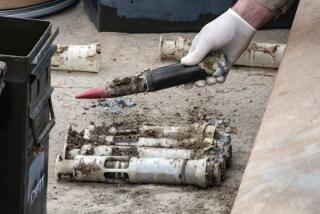Yugoslavia Tries to Dispel Radiation Fears
- Share via
BELGRADE, Yugoslavia — Amid a health scare triggered by NATO’s use of munitions containing depleted uranium, Yugoslav officials tried Saturday to allay fears that the substance could be harmful to residents, while a World Health Organization official said there had been no increase in leukemia cases in Kosovo.
U.N. scientists who visited 11 areas struck by NATO munitions in Kosovo, a province of Serbia, Yugoslavia’s main republic, have confirmed they found signs of radioactivity at eight of the sites. Depleted uranium, which increases penetration of ammunition, carries threats of radiation and chemical poisoning.
The United Nations Environment Program collected soil, water and vegetation samples and conducted tests on buildings and destroyed vehicles. Some of the soil was “slightly contaminated,” the agency said.
However, “there is no danger of radiation unless a person finds himself on the very spot hit with the depleted uranium or holds such ammunition in his bare hands,” said Jovan Djukanovic, a Serbian government spokesman in the town of Bujanovac.
He said contaminated locations in southern Serbia had been sealed off.
Dr. Erik Schouten, WHO regional director in southern Serbia, also sought to calm fears heightened by local media coverage. He said that, based on preliminary tests in Kosovo, “we cannot conclude that the number of leukemia cases is increasing.” However, he said the assessment was not complete.
After the death from leukemia of a sixth Italian soldier who served with North Atlantic Treaty Organization peacekeeping forces in the former Yugoslav federation was made public last week--bringing the total European deaths to 16--the Italian government demanded a full accounting from the U.S-led alliance.
A U.N. statement said WHO and the U.N. mission in Kosovo had been aware of depleted uranium in Kosovo since NATO’s 11-week bombing campaign in 1999.
More to Read
Sign up for Essential California
The most important California stories and recommendations in your inbox every morning.
You may occasionally receive promotional content from the Los Angeles Times.













